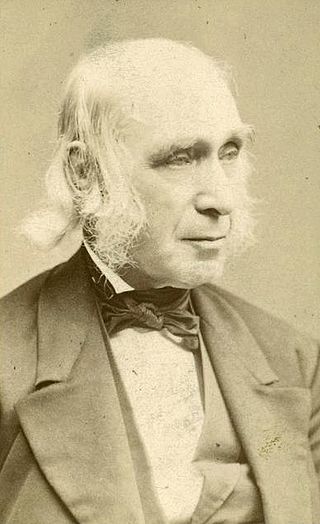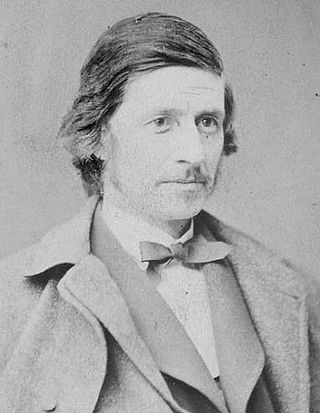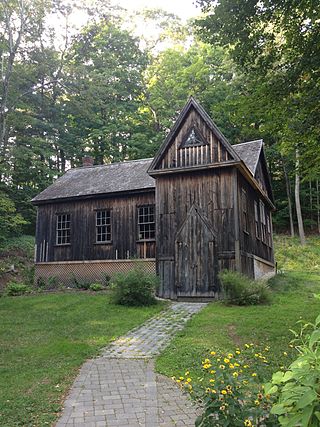Joel Myerson (September 9, 1945 - November 19, 2021) was a Distinguished Professor Emeritus of English Language and Literature at the University of South Carolina. He edited many books about the works of such American literary figures as Ralph Waldo Emerson, Henry David Thoreau, Nathaniel Hawthorne, Louisa May Alcott, Emily Dickinson, and Walt Whitman.
He served as President of the Ralph Waldo Emerson Society and the Thoreau Society, and as the founding President of the Louisa May Alcott Society.

Amos Bronson Alcott was an American teacher, writer, philosopher, and reformer. As an educator, Alcott pioneered new ways of interacting with young students, focusing on a conversational style, and avoided traditional punishment. He hoped to perfect the human spirit and, to that end, advocated a plant-based diet. He was also an abolitionist and an advocate for women's rights.

Louisa May Alcott was an American novelist, short story writer, and poet best known for writing the novel Little Women (1868) and its sequels Good Wives (1869), Little Men (1871) and Jo's Boys (1886). Raised in New England by her transcendentalist parents, Abigail May and Amos Bronson Alcott, she grew up among many well-known intellectuals of the day, including Margaret Fuller, Ralph Waldo Emerson, Nathaniel Hawthorne, Henry David Thoreau, and Henry Wadsworth Longfellow.

Ralph Waldo Emerson, who went by his middle name Waldo, was an American essayist, lecturer, philosopher, abolitionist, and poet who led the Transcendentalist movement of the mid-19th century. He was seen as a champion of individualism and critical thinking, as well as a prescient critic of the countervailing pressures of society and conformity. Friedrich Nietzsche thought he was "the most gifted of the Americans", and Walt Whitman called him his "master".

Concord is a town in Middlesex County, Massachusetts, United States. In the 2020 census, the town population was 18,491. The United States Census Bureau considers Concord part of Greater Boston. The town center is near where the Sudbury and Assabet rivers join to form the Concord River.
Transcendentalism is a philosophical, spiritual, and literary movement that developed in the late 1820s and 1830s in the New England region of the United States. A core belief is in the inherent goodness of people and nature, and while society and its institutions have corrupted the purity of the individual, people are at their best when truly "self-reliant" and independent. Transcendentalists saw divine experience inherent in the everyday, rather than believing in a distant heaven. Transcendentalists saw physical and spiritual phenomena as part of dynamic processes rather than discrete entities.

Sleepy Hollow Cemetery is a rural cemetery located on Bedford Street near the center of Concord, Massachusetts. The cemetery is the burial site of a number of famous Concordians, including some of the United States' greatest authors and thinkers, especially on a hill known as "Author's Ridge."

"The American Scholar" was a speech given by Ralph Waldo Emerson on August 31, 1837, to the Phi Beta Kappa Society of Harvard College at the First Parish in Cambridge in Cambridge, Massachusetts. He was invited to speak in recognition of his groundbreaking work Nature, published a year earlier, in which he established a new way for America's fledgling society to regard the world. Sixty years after declaring independence, American culture was still heavily influenced by Europe, and Emerson, for possibly the first time in the country's history, provided a visionary philosophical framework for escaping "from under its iron lids" and building a new, distinctly American cultural identity.

The Old Manse is a historic manse in Concord, Massachusetts, United States, notable for its literary associations. It is open to the public as a nonprofit museum owned and operated by the Trustees of Reservations. The house is located on Monument Street, with the Concord River just behind it. The property neighbors the North Bridge, a part of Minute Man National Historical Park.

March (2005) is a novel by Geraldine Brooks. It is a novel that retells Louisa May Alcott's novel Little Women from the point of view of Alcott's protagonists' absent father. Brooks has inserted the novel into the classic tale, revealing the events surrounding March's absence during the American Civil War in 1862. The novel won the 2006 Pulitzer Prize for Fiction.

Franklin Benjamin Sanborn was an American journalist, teacher, author, reformer, and abolitionist. Sanborn was a social scientist, and a memorialist of American transcendentalism who wrote early biographies of many of the movement's key figures. He founded the American Social Science Association, in 1865, "to treat wisely the great social problems of the day". He was a member of the so-called Secret Six, or "Committee of Six", which funded or helped obtain funding for John Brown's Raid on Harpers Ferry; in fact he introduced Brown to the others. A recent scholar describes him as "humorless."

The Concord School of Philosophy was a lyceum-like series of summer lectures and discussions of philosophy in Concord, Massachusetts, from 1879 to 1888.

The Ralph Waldo Emerson House is a house museum located at 18 Cambridge Turnpike, Concord, Massachusetts, and a National Historic Landmark for its associations with American philosopher Ralph Waldo Emerson. He and his family named the home Bush. The museum is open mid-April to mid-October; an admission fee is charged.
Anna Bronson Alcott Pratt was the elder sister of American novelist Louisa May Alcott. She was the basis for the character Margaret "Meg" of Little Women (1868), her sister's classic, semi-autobiographical novel.

The Wheeler-Minot Farmhouse, also known as the Thoreau Farm or the Henry David Thoreau Birthplace, is a historic house at 341 Virginia Road in Concord, Massachusetts, United States. It is significant as the birthplace of writer Henry David Thoreau. The house was listed on the National Register of Historic Places in 2004. It currently serves as a historic house museum and is open to the public.
Laura Dassow Walls is an American professor of English literature and currently the William P. and Hazel B. White Professor of English at the University of Notre Dame.

Fairyland Pond is a pond within Hapgood Wright Town Forest, a conservation area in Concord, Massachusetts. It is a popular recreation area, notable for its old-growth forest and its association with many literary figures from Concord’s past.
A Yankee in Canada, with Anti-Slavery and Reform Papers is an anthology of works by Henry David Thoreau, edited by his sister Sophia Thoreau and his friends William Ellery Channing and Ralph Waldo Emerson. It was published in 1866, after Thoreau’s death, by Ticknor and Fields, the Boston firm that had published Walden.
Minot Pratt was a founder, a director and head farmer of the Brook Farm experimental community, a printer, a friend of noted Concord, Massachusetts, writers, Henry David Thoreau, Amos Bronson Alcott, Louisa May Alcott, Ralph Waldo Emerson, and Nathaniel Hawthorne, and a naturalist in Concord, Massachusetts. At his death in 1878 it was written of him: “his recreation, and one might say, his worship, was among the wild-flowers and woodlands, which he knew almost as familiarly as Thoreau did. Thoreau was a ‘poet-naturalist,’ Minot Pratt was a farmer-naturalist, -- but in both the love of nature was far stronger than the mere scientific thirst for knowledge. They revered nature and treated her with the modesty due to a maiden, and with the respect of a young lover. This sentiment did not wither as age came on.”
The Concord Female Anti-Slavery Society was a female abolitionist organisation in Concord, Massachusetts, in the mid 19th century. This society was a significant influence on Henry David Thoreau, Ralph Waldo Emerson, and Louisa May Alcott.
Sophia Foord (1802-1885) was an American schoolteacher and abolitionist from Dedham, Massachusetts.